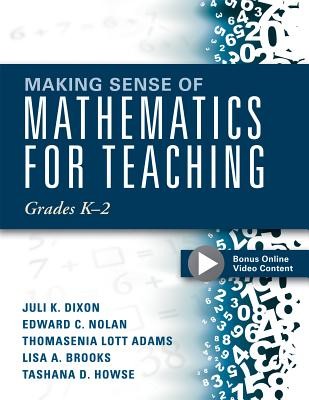
- We will send in 10–14 business days.
- Author: Juli K Dixon
- Publisher: SOLUTION TREE
- ISBN-10: 1942496397
- ISBN-13: 9781942496397
- Format: 21.3 x 27.7 x 1.5 cm, minkšti viršeliai
- Language: English
- SAVE -10% with code: EXTRA
Reviews
Description
Develop a deep understanding of mathematics. This user-friendly resource presents grades K-2 teachers with a logical progression of pedagogical actions, classroom norms, and collaborative teacher team efforts to increase their knowledge and improve mathematics instruction. Explore strategies and techniques to effectively learn and teach significant mathematics concepts and provide all students with the precise, accurate information they need to achieve academic success. Clarify math essentials with figures and tables that facilitate understanding through visualization.
Benefits
- Dig deep into mathematical modeling and reasoning to improve as both a learner and teacher of mathematics.
- Explore how to develop, select, and modify mathematics tasks in order to balance cognitive demand and engage students.
- Discover the three important norms to uphold in all mathematics classrooms.
- Learn to apply the tasks, questioning, and evidence (TQE) process to ensure mathematics instruction is focused, coherent, and rigorous.
- Use charts and diagrams for classifying shapes, which can engage students in important mathematical practices.
- Access short videos that show what classrooms that are developing mathematical understanding should look like.
Contents
Introduction
1 Number Concepts and Place Value
2 Word Problem Structures
3 Addition and Subtraction Using Counting Strategies
4 Addition and Subtraction Using Grouping Strategies
5 Geometry
6 Measurement
Epilogue Next Steps
Appendix A Completed Classification of Triangles Chart
Appendix B Completed Diagram for Classifying Quadrilaterals
EXTRA 10 % discount with code: EXTRA
The promotion ends in 23d.05:20:38
The discount code is valid when purchasing from 10 €. Discounts do not stack.
- Author: Juli K Dixon
- Publisher: SOLUTION TREE
- ISBN-10: 1942496397
- ISBN-13: 9781942496397
- Format: 21.3 x 27.7 x 1.5 cm, minkšti viršeliai
- Language: English English
Develop a deep understanding of mathematics. This user-friendly resource presents grades K-2 teachers with a logical progression of pedagogical actions, classroom norms, and collaborative teacher team efforts to increase their knowledge and improve mathematics instruction. Explore strategies and techniques to effectively learn and teach significant mathematics concepts and provide all students with the precise, accurate information they need to achieve academic success. Clarify math essentials with figures and tables that facilitate understanding through visualization.
Benefits
- Dig deep into mathematical modeling and reasoning to improve as both a learner and teacher of mathematics.
- Explore how to develop, select, and modify mathematics tasks in order to balance cognitive demand and engage students.
- Discover the three important norms to uphold in all mathematics classrooms.
- Learn to apply the tasks, questioning, and evidence (TQE) process to ensure mathematics instruction is focused, coherent, and rigorous.
- Use charts and diagrams for classifying shapes, which can engage students in important mathematical practices.
- Access short videos that show what classrooms that are developing mathematical understanding should look like.
Contents
Introduction
1 Number Concepts and Place Value
2 Word Problem Structures
3 Addition and Subtraction Using Counting Strategies
4 Addition and Subtraction Using Grouping Strategies
5 Geometry
6 Measurement
Epilogue Next Steps
Appendix A Completed Classification of Triangles Chart
Appendix B Completed Diagram for Classifying Quadrilaterals


Reviews